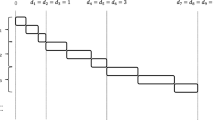Abstract
Given a sequencing of jobs on a single machine, each one with a weight, processing time, and a due date, the tardiness of a job is the time needed for its completion beyond its due date. We present an FPTAS for the basic scheduling problem of minimizing the total weighted tardiness when the number of distinct due dates is fixed. Previously, an FPTAS was known only for the case where all jobs have a common due date.
Full version at http://www.cas.mcmaster.ca/~gk/papers/tardiness_fixed.pdf
Preview
Unable to display preview. Download preview PDF.
Similar content being viewed by others
References
Abdul-Razaq, T.S., Potts, C.N., Van Wassenhove, L.N.: A survey of algorithms for the single machine total weighted tardiness scheduling problem. Discrete Applied Mathematics 26, 235–253 (1990)
Cheng, T.C.E., Ng, C.T., Yuan, J.J., Liu, Z.H.: Single machine scheduling to minimize total weighted tardiness. Eur. J. Oper. Res. 165, 423–443 (2005)
Du, J., Leung, J.Y.-T.: Minimizing total tardiness on one machine is NP-hard. Mathematics of Operations Research 15, 483–495 (1990)
Kellerer, H., Strusevich, V.A.: A Fully Polynomial Approximation Scheme for the Single Machine Weighted Total Tardiness Problem With a Common Due Date. Theoretical Computer Science 369, 230–238 (2006)
Kolliopoulos, S.G., Steiner, G.: Approximation Algorithms for Minimizing the Total Weighted Tardiness on a Single Machine. Theoretical Computer Science 355(3), 261–273 (2006)
Lawler, E.L.: A pseudopolynomial algorithm for sequencing jobs to minimize total tardiness. Ann. Discrete Math. 1, 331–342 (1977)
Lawler, E.L.: A fully polynomial approximation scheme for the total tardiness problem. Operations Research Letters 1, 207–208 (1982)
Lenstra, J.K., Rinnooy Kan, A.H.G., Brucker, P.: Complexity of machine scheduling problems. Ann. Discrete Math. 1, 343–362 (1977)
McNaughton, R.: Scheduling with due dates and loss functions. Management Sci. 6, 1–12 (1959)
Sen, T., Sulek, J.M., Dileepan, P.: Static scheduling research to minimize weighted and unweighted tardiness: a state-of-the-art survey. Int. J. Production Econom. 83, 1–12 (2003)
Yuan, J.: The NP-hardness of the single machine common due date weighted tardiness problem. Systems Sci. Math. Sci. 5, 328–333 (1992)
Author information
Authors and Affiliations
Editor information
Editors and Affiliations
Rights and permissions
Copyright information
© 2009 Springer-Verlag Berlin Heidelberg
About this paper
Cite this paper
Karakostas, G., Kolliopoulos, S.G., Wang, J. (2009). An FPTAS for the Minimum Total Weighted Tardiness Problem with a Fixed Number of Distinct Due Dates. In: Ngo, H.Q. (eds) Computing and Combinatorics. COCOON 2009. Lecture Notes in Computer Science, vol 5609. Springer, Berlin, Heidelberg. https://doi.org/10.1007/978-3-642-02882-3_24
Download citation
DOI: https://doi.org/10.1007/978-3-642-02882-3_24
Publisher Name: Springer, Berlin, Heidelberg
Print ISBN: 978-3-642-02881-6
Online ISBN: 978-3-642-02882-3
eBook Packages: Computer ScienceComputer Science (R0)




